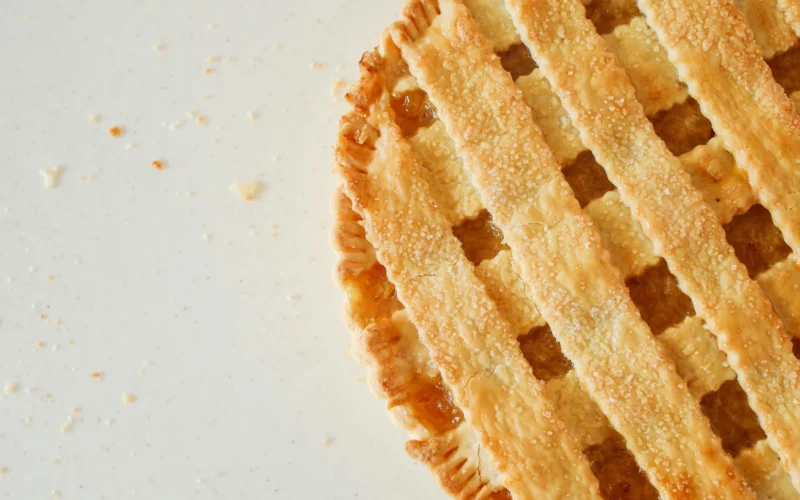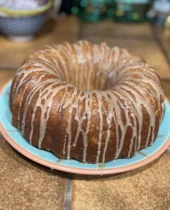Foolproof Pie Crust
Buttery, flakey and nearly impossible to mess up. This pie crust is as easy as 1, 2, 3!

Buttery, flaky, and nearly impossible to mess up—your go-to recipe for perfect pies.
If homemade pie crust has ever left you frustrated, cracked, or reaching for the store-bought kind… this recipe is your turning point. With just a few basic ingredients and one simple method, you’ll get consistent, bakery-worthy results every time—no special tools, no complicated steps, and no pastry school required.
Whether you’re baking a fruit pie, savory tart, or holiday classic, this crust brings buttery bliss and stress-free prep to the table.
“Once I nailed this crust, my pies went from ‘good’ to bakery-worthy. I’ll never go back.”
Why You’ll Love It
Flaky & Tender: The butter-laden layers bake up crisp and golden, never tough or soggy.
Foolproof Mixing: Comes together easily by hand or with a mixer—whatever works best for you.
No Shrinking, No Cracking: Thanks to smart ingredient ratios and proper chilling.
Versatile & Make-Ahead Friendly: Use it for sweet or savory, now or later.
Ingredients & Substitutions
| INGREDIENT | WHY IT MATTERS | NOTES / SWAPS |
|---|---|---|
| All-Purpose Flour | Provides structure with tenderness | Pastry flour = even more delicate crumb |
| Cold Butter | Adds rich flavor & flaky layers | Use high-fat butter (82%+) for best results |
| Apple Cider Vinegar | Tenderizes, reduces gluten formation | Lemon juice or white vinegar work in a pinch |
| Egg | Adds richness and stability; helps prevent shrinkage | Use a flax egg for vegan (1 tbsp flax + 3 tbsp water) |
| Salt | Enhances flavor | Reduce or omit for low-sodium diets |
| Ice Water | Binds the dough while keeping it cool | Start with less, add as needed |
Pie Crust Recipe Tips
- – Keep everything as cold as possible: Cold ingredients = crisp, flaky crust. I store everything—the mixer bowl, paddle attachment, even the measuring cup—in my fridge the day before I want to make a batch of pie crust. If you are a bit short on time, you can store everything in the freezer for an hour.
- – Work the dough as little as possible: Pie crust relies on making sure there is as little gluten production as possible. As soon as you add the wet to the dry, combine everything as little as you can.
- – Use High-Quality Butter: This crust is an all-butter pie crust, which means your choice of butter is essential. Try to go for one that is over 80% butterfat; European butter is even better.
Frequently Asked Questions (FAQ)
Why is my crust tough instead of flaky?
This usually happens when the dough is overmixed or too much water is added. Handle the dough gently, and stop mixing as soon as it holds together.
What does vinegar do in pie crust?
A splash of vinegar helps inhibit gluten formation, which keeps the crust tender and helps prevent shrinkage as it bakes.
Why is my dough cracking when I roll it?
It’s likely too cold. Let the dough sit at room temperature for 5–10 minutes before rolling to make it more pliable.
Do I need to blind bake this crust?
Only if your pie filling is no-bake or very wet (like custards or creams). Blind baking helps the bottom stay crisp. Just follow the blind bake instructions in the recipe.
Can I use this for savory pies?
Yes! Just reduce the sugar (if added) and maybe toss in a pinch of herbs like thyme or black pepper for a savory boost.
What if I don’t have pie weights for blind baking?
No problem—use dried beans, rice, or even granulated sugar. Just be sure to line the crust with parchment first.
Foolproof Pie Crust
Prep Time: 1 hour15 minutes
Cook Time: 0 Minutes
Total Time: 1 hour 15 minutes
Servings: 2 Crusts for a 9 inch pie pan
Equipment
Mixing Bowl
Fork or Pastry Cutter
Stand or Hand Mixer
Plastic Wrap
Parchment Paper
Ingredients
2 ½ cups (300g) All-Purpose Flour, 1 cup (230g) Butter, cold
1 teaspoon (6g) Salt
1 beaten Egg, cold
½ cup (110g) Ice Water
1 ½ (10g) teaspoons Apple Cider Vinegar
Directions
Step 1: Prepare the Dry Ingredients
- – In a large mixing bowl, combine the all-purpose flour and salt.
- – Cut the cold butter into small cubes and add them to the flour mixture.
Step 2: Incorporate the Butter
- – Using a fork or pastry cutter, cut the cold butter into the flour until the mixture resembles coarse crumbs with pea-sized chunks of butter.
- – Alternatively, use a stand or hand mixer with a paddle attachment on a low setting to incorporate the butter.
Step 3: Add the Wet Ingredients
- – In a separate bowl, whisk together the cold beaten egg, ice water, and apple cider vinegar.
- – Slowly add the egg mixture to the flour-butter mixture, a little at a time, mixing just until the dough begins to come together. You may not need all of the liquid, so add it slowly until the dough holds together when pressed.
Step 4: Form the Dough
- – Turn the dough out onto a lightly floured surface and gently knead it a few times to bring it together into a ball.
- – Divide the dough in half and shape each half into a disc.
Step 5: Chill the Dough
- -Wrap each disc of dough in plastic wrap and refrigerate for at least 1 hour (or up to 2 days).
- – Chilling helps the dough relax and prevents shrinking during baking.
Step 6: Roll Out the Dough
- – Once chilled, lightly flour your work surface and rolling pin.
- – Roll out each disc of dough into a 12-inch circle, about ⅛ inch thick.
- – Place the rolled dough into your pie pan, gently pressing it into the bottom and sides. Trim the edges as necessary and crimp the edges for a decorative finish.
Tip: If you need to blind-bake the crust, line the dough with parchment paper and fill it with pie weights or dried beans. Bake in a preheated 375°F (190°C) oven for about 10-12 minutes, or until the edges are lightly golden.
Simple Baker’s Tips
Keep It Cold: Butter, tools, even your hands if needed—cold dough = flaky results.
Don’t Overmix: Stir just until the dough holds together. Too much mixing makes it tough.
Use Good Butter: Better butter = better pie. European-style is worth it here.
Freeze Ahead: Wrapped dough discs keep in the freezer for up to 3 months.

